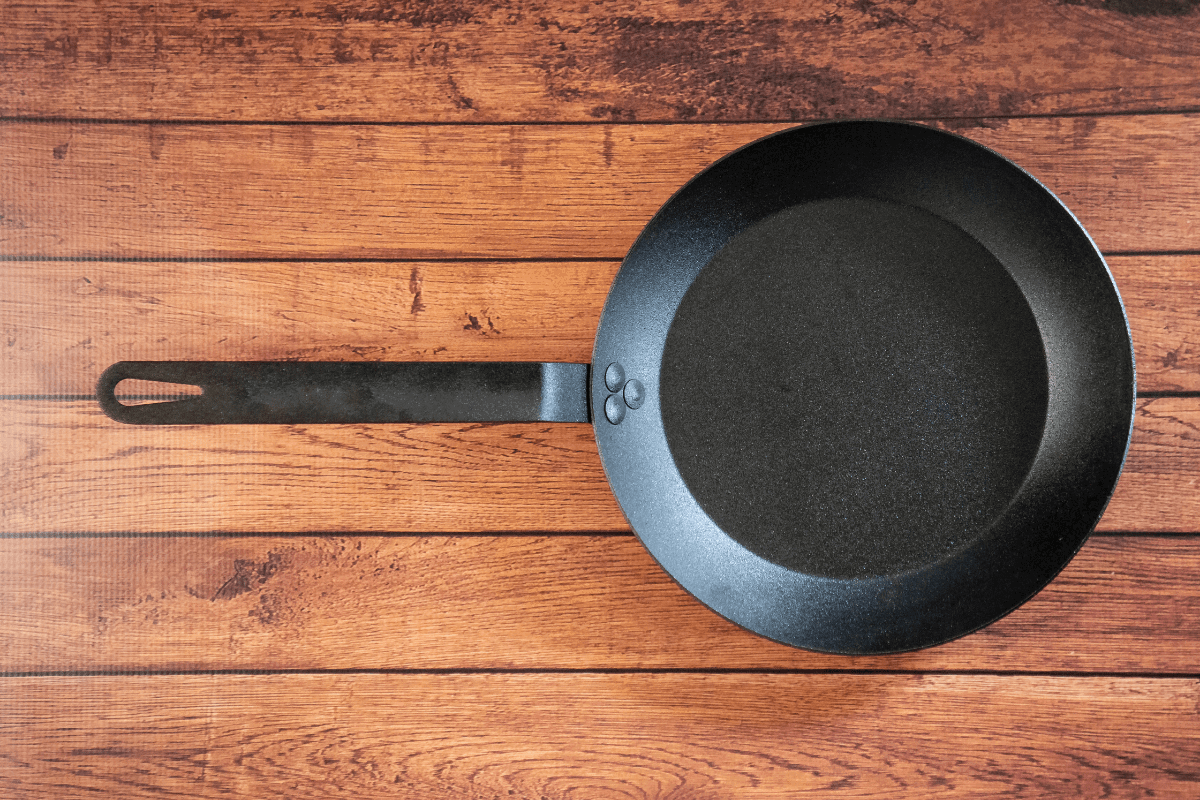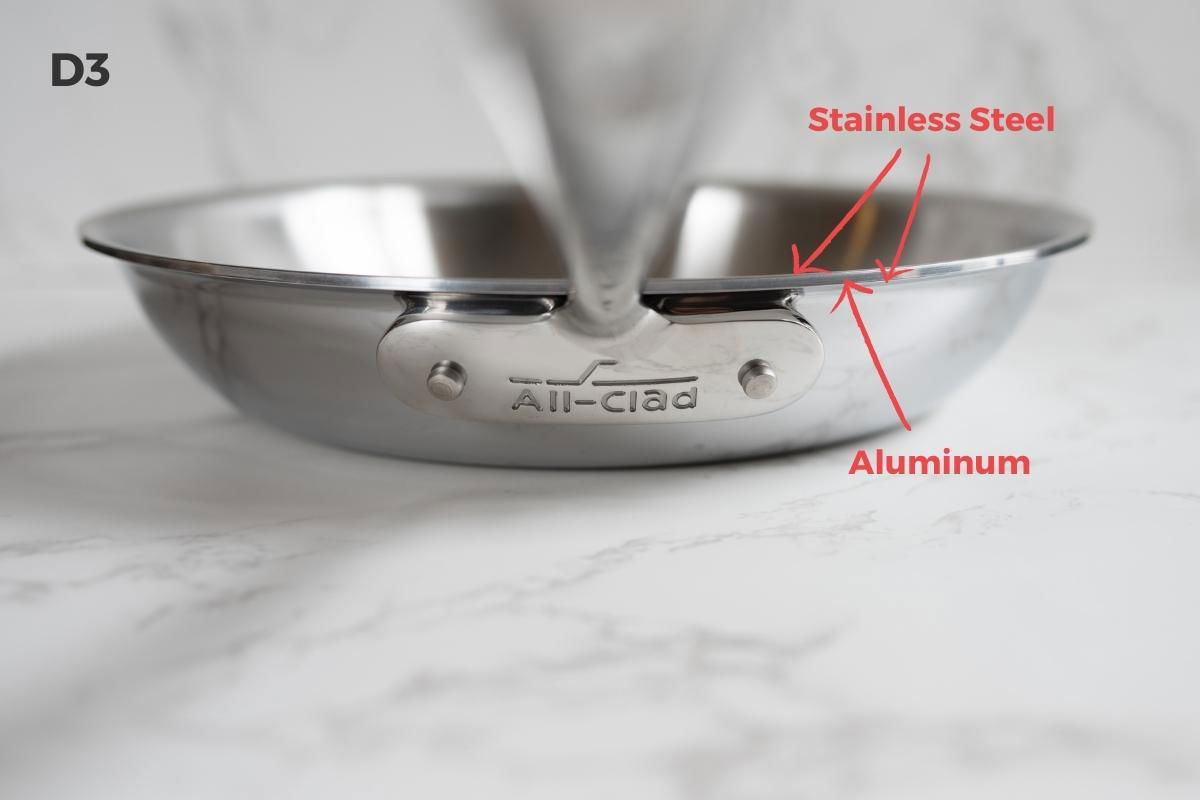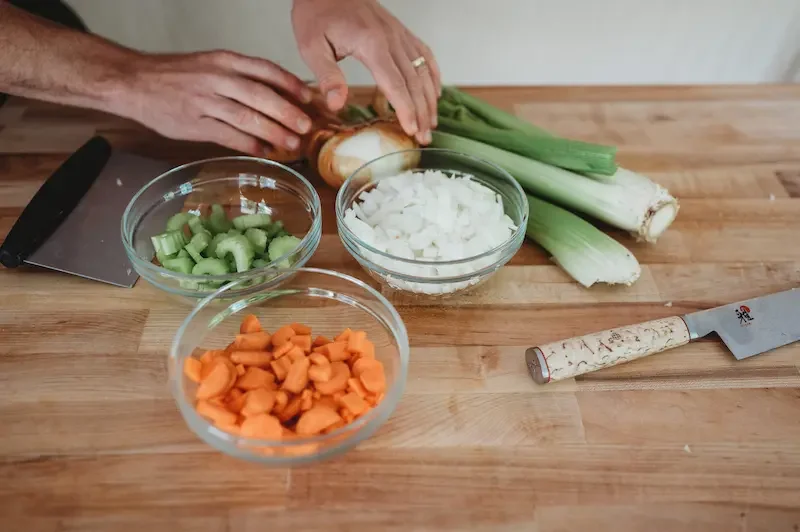Damascus knives are renowned for their beauty and performance. But that respected reputation has given rise to a problem: Many so-called “damascus knives” are imitations, not the real deal.
To help you sort through that, I’ve carefully sourced and selected three examples of genuine damascus steel kitchen knives. Taken together, they represent the best damascus steel knives for at-home chefs, bar none.
Read on, and together we’ll explore the ins and outs of damascus steel. Then, we’ll relate what we’ve learned back to the damascus chef knives featured here.
In This Article
Our Top Picks
Here are the best Damascus knife makers:
- Beautiful, clean look
- Excellent sharpness and durability
- Very beginner friendly
- VG10 core gives it greater durability and resistance to chipping
- Hammered finish reduces friction and makes for smoother cuts
- Stain resistant steel is relatively low maintenance
- VG-10 core and damascus cladding gives it great sharpness and durability
- Hammered finish for great looks and smooth cuts
- Rosewood handle with mahogany detailing is absolutely gorgeous.
- The Wa handle is ornate, comfortable, and made from 2000 yr-old wood.
- Hand-hammered 46 layer Damascus, and you can see every hammer stroke.
- Balance is forward, which makes this knife excellent for a pinch grip.
Detailed Damascus Steel Chef Knife Reviews
Shun Classic Blonde 8” Chef's Knife
Shun is largely responsible for bringing awareness of Japanese knives to the United States. So it should come as no surprise that their classic chef’s knife makes great use of the ever-popular damascus finish. Falling somewhere between a Western and a Japanese design, it’s the ideal choice for damascus knife first-timers.
Another example of a modern take on the style, Shun’s 8-inch chef’s knife is made with a VG-MAX core and forged damascus cladding. This gives it an excellent combination of looks and performance, with great sharpness and durability.
Perhaps the biggest draw for Shun’s damascus chef knives is their Western blade shape combined with lightweight Japanese-style construction. This means you won’t have to relearn or adapt your cutting style, and you’ll still get all the benefits of a super sharp Japanese blade.
The traditional D-shaped handle is a nice introduction to Japanese-style knives, but it’s friendly to beginners as well. You can hold it with a standard grip, or move your fingers further up the handle to start using the pinch grip favored by Japanese chefs.
Of all the damascus knives featured here, the Shun shows off its damascus patterning the most. If you’re drawn to these knives as a showpiece, this blade from Shun is probably your best bet. It has a clean look and feel that is beautiful when put on display.
What we like
- Beautiful, clean look
- Excellent sharpness and durability
- Very beginner friendly
What We don’t
- D-shaped handle is one-sided, and only for right-handed chefs
- Not the right choice if you’re looking for a traditional Japanese blade
- Lack of hammered finish means ingredients may stick to the blade
Sakai Takayuki Hammered Damascus Gyuto
Though less well known than major Japanese name brands, Sakai Takayuki’s blades are a favorite of professional chefs. That’s due in large part to their combination of excellent sharpness and durability with a stunning aesthetic. And perhaps no knife shows this combo better than their Hammered Damascus Gyuto.
Made in a more modern style, this damascus chef knife has a VG10 steel core with a damascus cladding. That gives it both excellent resistance to chipping and bending, and an exceptionally sharp cutting edge.
The hammered finish on this blade, also known as tsuchime, lets it slice smoothly and with great ease. By creating many small air pockets, the irregular hammering reduces friction on the blade as it cuts. That in turn prevents your ingredients from sticking to it.
Even better, the modern production methods used for making this knife give it high stain resistance. It’s quite low maintenance compared to traditional damascus or high carbon steel blades.
Round all of that out with an ergonomic hardwood handle, and you have what I consider to be the best damascus chef knife around. Whether you’re a beginner or seasoned veteran, you’ll appreciate the fine details of this standby chef’s knife.
What we like
- VG10 core gives it greater durability and resistance to chipping
- Hammered finish reduces friction and makes for smoother cuts
- Stain resistant steel is relatively low maintenance
What We don’t
- Transitioning to a Japanese style blade may require re-learning some knife skills
- Not everyone likes the look of the hammered finish
- Lightweight style may not suit ever
Yoshihiro Hammered Damascus Gyuto
Yoshihiro’s Hammered Damascus Gyuto takes everything that’s great about traditional Japanese blade smithing, and updates it for maximum performance. A gorgeous and distinctive knife with extreme attention to detail, I think it’s the best damascus chef knife for cooks who have experience with Japanese blades.
Once again, we encounter the combination of a VG-10 steel core with layers of damascus cladding. As with the other knives in this review, this gives the knife excellent sharpness and durability. But in the Yoshihiro, you’ll also notice that it gives a lightweight but balanced feel that’s hard to find in Western knives.
The hammered tsuchime finish on this chef’s knife is given a high polish, really making the transition from hammered to damascus stand out. It makes every cut smoother and easier, too, by creating air pockets that reduce friction during the cut.
A real rosewood handle is given further distinction by the mahogany bolster and butt. It’s made in the octagonal style favored by sushi chefs, too — just one more detail that sets this knife apart from the competition.
Overall, Yoshihiro’s Hammered Damascus Gyuto is the sort of knife that professional chefs drool over. It may not be the best choice for inexperienced cooks, but anyone who is confident in their knife skills will be blown away by its combination of looks and performance.
What we like
- VG-10 core and damascus cladding gives it great sharpness and durability
- Hammered finish for great looks and smooth cuts
- Rosewood handle with mahogany detailing is absolutely gorgeous.
What We don’t
- Expensive
- Takes a fair bit of skill to handle well
- Not great for beginners
DALSTRONG Chef Knife - Shogun Series
Dalstrong makes their knives with Japanese steel, in the Japanese style. But they’re manufactured in China, which is why they can be offered at such low prices. But in the case of their Shogun Series chef’s knife, I don’t think the slightly lower cost really makes up for the loss of a traditional wooden handle. That said, if you like the look of the synthetic polymer handle, the quality of the blade itself is top-notch.
Zelite Infinity Damascus Chef Knife
A relative newcomer to the kitchen knife world, Zelite uses the same tactics as Dalstrong to produce inexpensive knives — meaning that they source steel from Japan, but produce their knives in China to keep costs low.
And really, their Damascus Chef Knife is almost a dead ringer for the Dalstrong featured above, minus the hammered finish. The quality looks to be good, but I’d have to use these knives longer to give a statement about their durability and longevity.
TUO Damascus Chef’s Knife
With this last knife, you may notice a pattern — because like the two before it, TUO’s knives are manufactured in China but made from Japanese steel. And their Damascus Chef’s Knife is the least expensive for a reason: Its finish is partially fabricated, and not entirely from a traditional damascus process. It’s an alright knife for the price, but doesn’t stand up to the competition if you’re looking for a true damascus knife.
What To Look For
Number of Layers
The pattern on a true damascus steel blade is indicative of the time and attention put into its crafting. As the knifemaker folds the steels together time and again, the pattern will evolve into greater and greater complexity.
Generally, the more times a damascus steel knife has been folded, the greater its durability and edge retention. That’s because the mix of high and low carbon steels gets finer and finer the more the material is worked — up to a point. Experienced knife makers know when enough is enough, and will stop before any additional folding will weaken the blade.

Handle
Because the main benefit of a damascus steel knife is aesthetic, the handle often receives extra attention as well. Look for a knife with a traditional wooden handle, and find one that you enjoy the looks of.
If you’re experienced with Japanese knives, a D-shaped or octagonal handle is a nice touch. Otherwise, stick with the regular tapered or straight handles favored for Western blades.

Balance
If you choose a traditionally crafted damascus steel knife, you can trust that its balance will be impeccable. The extra time and attention that’s put into this type of knife means that each one is a finely tuned work of art.
Conversely, you can spot an imitation damascus blade by its lack of balance. The blade will be heavier or lighter than is ideal, depending on the type of metal that’s been made to look like damascus steel.
Price
Compared to most other steels used for knives, damascus steel commands a higher price. You can expect to pay no less than $150 for a real damascus chef knife, though many are offered closer to $200 or more.
Advantages Of Damascus Steel
Damascus steel’s sharpness and durability have given it a legendary reputation. But how does that tradition actually stand up against modern metallurgy methods?
Aesthetic
Thanks to advances in the production of high carbon, damascus steel is no longer the only material that can make sharp and durable blades. It’s still one of the most gorgeous blades, though, and many chefs prize it for its combination of looks and performance.
Compared to a regular stainless steel blade, a damascus knife will be significantly sharper and have better edge retention. Compared to high carbon steel blades, however, it has equal performance in all cutting categories.

Construction
All damascus steel blades are not made equally. Today, you’ll find them in three main styles:
- Cast, which are made using the traditional method of folding different types of steel dozens of times throughout the forging process. This is “true” damascus steel as we know it.
- Fabricated, which replicate the look of damascus steel but do not go through the traditional processes. These knives are not true damascus steel, and may lack the quality expected of the category.
- Modern, or coated blades use a pure steel core, and surround it with layers of forged damascus steel. Some knifemakers choose this route to provide extra strength and stability to their finished products. These can also have the benefit of being stain-resistant where other steel types are not.
Edge Retention
Knives made of true damascus steel hold an edge as well as any other top-quality knife on the market today. If you observe responsible cutting practices (not cutting on glass or granite, avoiding bones, and keeping your knife clean and dry), your damascus knife will only need to be sharpened every six months or so.
Corrosion
A damascus steel knife may or may not rust, depending on how it’s made and its metallic composition. Modern damascus knives often include a stain-resistant finish, while more traditional knives are prone to rust if not kept clean and dry.
Care routine
Depending on the type of damascus knife you buy, its care and maintenance requirements will differ.
Traditional cast damascus blades are not stain-resistant. This means you’ll have to go to extra lengths to keep them clean and dry. Wipe them dry in between cuts while you’re working, especially if you’re cutting acidic ingredients like oranges or pineapples. Then, rub in a thin coat of mineral oil when you’re finished cutting for the day.
Modern damascus-style knives are more forgiving and require less maintenance. They’re often stain-resistant, so simply keeping them dry and clean between uses is enough.
For any type of knife, though, you’ll want to store them safely and keep them sharp. This means having a knife storage solution rather than leaving them to bang around in a drawer. Do-it-your-selfers will learn to sharpen their own knives at home, but professional sharpening services are also available.
Sharpening
Damascus steel can be sharpened using the same methods as any other type of steel. But to give a damascus kitchen knife the sharpest edge possible, it’s best to use traditional sharpening stones.
My Recommendations
Do you think a damascus steel knife is the right choice for your kitchen? To recap, here’s who I think each knife is best for:
The Sakai Takayuki Hammered Damascus Gyuto is a wonderful introduction to this style of knife. It’s the best all-rounder featured in this review, as the handle and blade design are good for both new and experienced chefs.
Shun’s Classic Blonde 8” Chef’s Knife is definitely the best choice for beginners, as its design is closer to that of a standard Western knife with Japanese touches.
Yoshihiro’s Hammered Damascus Gyuto caters to the experienced chef — particularly someone with practice using Japanese knives. It’s the most gorgeous and distinctive knife featured here, as well as the most expensive.
FAQs
Are Damascus Knives worth it?
Buying a damascus steel chef knife will likely be one of the biggest investments you’ll make in a kitchen tool. So to answer the question of whether it’s a good investment, you’ll have to ask yourself one big question:
How much do you value the aesthetics of your kitchen knives?
That’s because the damascening process is a lengthy and expensive one, and its benefits are primarily visual. True damascus steel is very high quality, but you can find knives with equal or better performance at a lower price — minus the attractive look to the blade, of course.
If having a chef’s knife that’s as beautiful as it is sharp is important to you, though, a damascus knife is definitely the right way to go.
Why Is Damascus Steel So Good?
Damascus steel has a reputation for being incredibly sharp and durable. And prior to the advances of modern metallurgy, it was likely the sharpest steel available for swords and knives.
Today, however, damascus steel lives on because of its stunning good looks. High carbon steel knives are easier to make and cost less, while offering the same sort of performance as damascus steel.
What type of knives should I get with Damascus steel?
Because true damascus steel knives are quite expensive, it’s best to invest your money in a knife you’ll be using often. A damascus steel chef knife is the way to go, as you’ll be using it for the majority of your cutting tasks.















